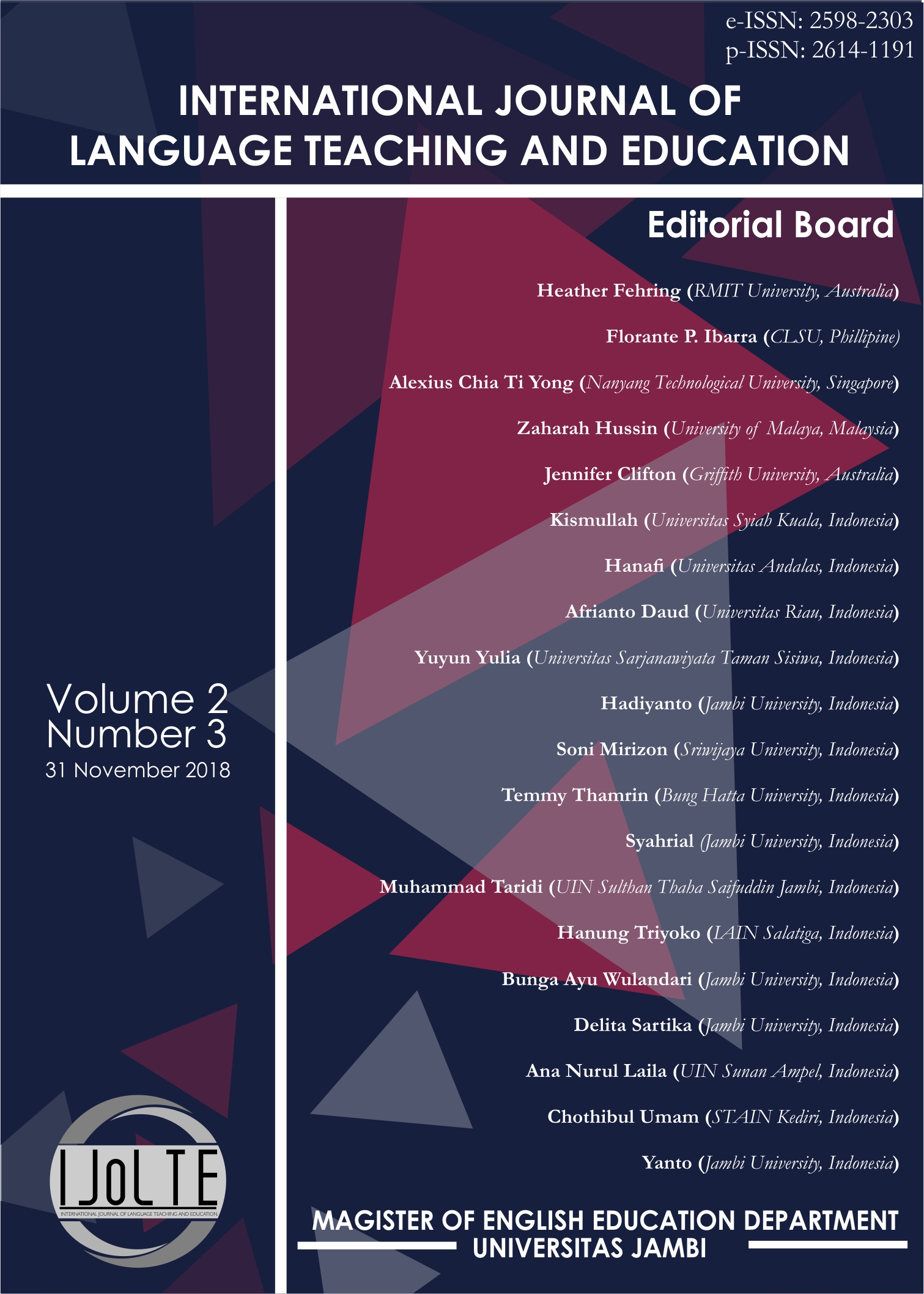Interpersonal Realizations of Pedagogic Discourse in Indonesian EFL Classrooms
DOI:
https://doi.org/10.22437/ijolte.v2i3.5678Abstract
This paper describes the lexicogrammatical realizations of interpersonal meaning in English as a Foreign Language (EFL) classrooms in Indonesian university context. The realizational grammatical patterns are presented using MOOD system in systemic functional linguistics (SFL). The data of this study were three EFL classrooms taken from three English departments in Indonesian universities in Semarang City. Data analyses were done by transcribing the lectures and then divided them into clauses from which the lexicogrammatical realizations of pedagogic MOOD were identified and classified based on MOOD System as suggested by Halliday & Matthiessen in SFL perspectives. The results of the study show that interpersonally, the clauses used in the EFL classrooms are predominated by declarative clause, interrogative clause, and imperative clause. The predominance of declarative clause is influenced by the teacher-centered teaching method used in the classrooms. This method poses lecturer as an expert and students as novice. In this situation, lecturer dominates in giving information about the learning materials. Besides, interrogative clause is also used by lecturer to know the students’ understanding of the learning materials. Finally, imperative clause is also used to ask students to do something relating to the understanding of the learning materials.
Downloads
Downloads
Published
Versions
- 2018-12-01 (1)
- 2018-12-01 (1)
How to Cite
Issue
Section
License
The Authors submitting a manuscript do so on the understanding that if accepted for publication, copyright of the article shall be assigned to International Journal of Language Teaching and Education (IJoLTe) and Magister Program of English Education Department, Universitas Jambi as publisher of the journal. Copyright encompasses rights to reproduce and deliver the article in all form and media, including reprints, photographs, microfilms, and any other similar reproductions, as well as translations.
IJoLTe keep the rights to articles that have been published. And, the authors are permitted to disseminate published article by sharing the link of IJoLTe' website. Authors are allowed to use their works for any purposes deemed necessary without written permission from IJoLTe with an acknowledgement of initial publication in this journal.
IJoLTe and Magister Program of English Education Department, Universitas Jambi, and the Editors make every effort to ensure that no wrong or misleading data, opinions or statements be published in the journal. In any way, the contents of the articles and advertisements published in IJoLTe are the sole and responsibility of their respective authors and advertisers.
If the article was jointly prepared by more than one author, any authors who submitting the manuscript warrants that he/she has been authorized by all co-authors to be agreed on this copyright and license notice (agreement) on their behalf, and agrees to inform his/her co-authors of the terms of this policy. IJoLTe will not be held liable for anything that may arise due to the author(s) internal dispute. IJoLTe will only communicate with the corresponding author.
By submitting the article/manuscript to this journal, the authors agree with this policy and consciously agree that IJoLTe does not provide royalties or other fees to the authors for their published articles. By agreeing this policy, IJoLTe ensures that published articles are publicly accessible and will be free of charge for the readers. No specific document sign-off is required.
Users of this website will be licensed to use materials from this website following the Creative Commons Attribution 4.0 International License. Please use the materials accordingly
You are free to:
- Share — copy and redistribute the material in any medium or format
- Adapt — remix, transform, and build upon the material for any purpose, even commercially.
- The licensor cannot revoke these freedoms as long as you follow the license terms.








1.png)
